- Home
- Deepak Chopra
Reinventing the Body, Resurrecting the Soul: How to Create a New You Page 10
Reinventing the Body, Resurrecting the Soul: How to Create a New You Read online
Page 10
Familiar as they seem, both of these forces are mysterious. Despite the acceptance of Darwinian evolution by the scientific community, nobody knows why or how Nature takes sudden creative leaps. You would never guess, looking at the fossils of the tiniest dinosaurs that scrambled underfoot as their huge kin shook the earth, that these would be the ultimate survivors of the disaster that wiped huge dinosaurs out. Still less would you have been able to see in their scaly skins the potential for hair, fur, and feathers. But without that hidden possibility, mammals and birds could not have evolved.
Evolution doesn’t telegraph what its next creative leap will be. This is especially true in human beings. Our Stone Age ancestors had no skill at mathematics (it is disputed whether Neanderthal man could count; certain Australian aborigines still use a system of “one, two, and many” as their only arithmetic), and yet, hidden in their cerebral cortex was a staggering capacity for advanced calculations. And ordinary memory, which seems quite limited, can expand at will. With practice, you or I could memorize every word of the Bible, and a precious few individuals are gifted with total photographic memory, being able to recall every moment of their lives.
There is no indication that memory has any evolutionary limits, either. It could keep unfolding, without end. The human brain seems set up for that already. A dramatic instance is a woman in her mid-thirties named Jill Price who developed total recall more or less overnight at age fourteen. She describes how one side of her mind participates in everyday reality while the other projects a detailed movie of any day she wants to recall. Not only does she remember what she did on that day, as well as the food served on the family table and the news stories in the daily paper, if Price hears a few bars of a television theme song, she instantly knows the show in question and the day she heard the theme. She can name themes from series that were canceled after a handful of episodes.
This extremely rare gift is also a unique burden. Price’s memories come with all the original emotions attached. Somewhat overweight, she ruefully remembers every time her mother criticized her appearance. The title of her autobiography is tellingly poignant: The Woman Who Can’t Forget. Price’s onset of total recall was out of her control, but she reminds us of the vastness of human potential. (If every young child was given memory training, would we develop into a society with total recall?)
Entropy looks less mysterious, at least on the surface. It is simply Nature’s tendency to disperse energy and become less organized over time. Hot food grows cold if you let it stand; the entire universe grows colder by expanding in all directions, diffusing the original heat generated by the Big Bang. But life stands in opposition to this seemingly inflexible principle: all living things build up energy and become more and more complex. So why wasn’t Nature simply satisfied with cooling down? There was no real need for the primordial universe to build DNA, which traps billions of bits of energy along its double helix and gains more energy as we eat and digest food.
Life represents a cosmic capacity to manipulate both time and energy. As long as you take in more energy than you give off, you are stopping time. Time only runs out when energy runs out. Imagine a log in the fireplace that takes an hour to burn. That hour represents how much energy is available before “heat death” occurs. DNA makes energy available forever—or close enough, at two billion years so far, and counting. DNA functions as if it were immortal. Entropy isn’t banished; it still presses on your genes, coaxing them to break down, but life persists anyway and keeps evolving. To a physicist, your body is an island of “negative entropy,” because as long as it’s alive it refuses to cool down. A cell deprived of food and air for as little as three seconds begins to deteriorate; a brain deprived of oxygen for more than ten minutes begins to die. But these aren’t threats so long as your body knows how to manage time.
Now that you know the stakes, a choice must be made—evolve or decline—because the option of standing still isn’t available. If you sit in a chair and stop using your muscles, they will atrophy; the same holds true if you stop using your brain. The obvious choice is to side with evolution, because then you can grow in new, unexpected areas, giving your body an agenda that time cannot undo.
Controlling time
Mastery over time is built into you. Your body runs on multiple clocks, each set to a different speed. When you were a baby, your skull bones fused at a rate that was incredibly slow compared with the firestorm of new connections that your brain was creating by the millions every minute. Your mother’s immune cells, which were your only protection from disease when you were born, were dying as you developed your own antibodies. Your sexual organs were essentially dormant; your adult teeth were the tiniest of seeds. Dozens of different cycles were being controlled by the DNA that was originally contained in one cell, that first fertilized egg. You didn’t develop fast DNA for your brain and slow DNA for your skull bones. The same genetic code somehow coordinates events lasting from a few thousandths of a second (the firing of a neuron, the absorption of oxygen by a red blood cell) to a few years (losing your baby teeth, developing a full immune system), to entire decades (mature reasoning, gray hair, menopause).
What this amounts to is that your body is far from being time’s victim; on the contrary, it orchestrates time to your benefit. Once you force upon the body your own fears and negative beliefs about time, however, the trouble begins. Take the simple belief that there is never enough time. It’s this belief that creates deadlines, a highly symbolic word with overtones of mortality: if you run out of time before you cross the line, you’re dead. Your body plays its part in this belief. If you find yourself racing to meet a deadline, your heart rate will speed up, your blood vessels will constrict, and your mind will race to keep pace with everything you need to do. These are all disruptions of bodily rhythms and therefore disruptions of your body’s exquisite control of time. What’s more damaging is that you are treating time as an adversary.
There are many other ways in which this happens. As we’ve seen, research on stress has found that one of the biggest causes is uncertainty. If you place a mouse on a metal plate and give it harmless electric shocks at regular intervals, the mouse won’t be happy, but it will eventually adjust. If the same harmless shocks are administered at random intervals, however, the mouse grows exhausted to the point of death in a matter of a few days. Since life is full of unpredictability, adapting to it is a major challenge.
It’s the incidentals, ironically, that break your body down at the level where time is being controlled. When you focus anti-aging on the physical level—on exercise, diet, vitamins, antioxidants, weight loss, cosmetics, and plastic surgery—you bypass the invisible level that is far more important. Whatever breaks down your body’s timing creates aging. The culprit is not time itself. Look at the invisible factors that do the greatest damage:
Unpredictability. Random events disrupt your body’s rhythms.
Disorder, confusion. A breakdown of external order leads to inner disorder.
Accidents. Mistakes in your life lead to mistakes in your body.
Trauma, sickness. When wounded, your body loses track of time.
Violence. When attacked, your body’s timing is shattered.
Chaos. When all sense of order is destroyed, your body cannot manage time at all.
I’ve listed these damaging factors from least to most harmful because that’s how your body deals with them. It can adapt to unpredictability more easily than to disorder, and to disorder more easily than to accidents. Consider how everyday choices influence your body’s timing.
Unpredictability. Choosing to keep irregular hours, working the night shift, going to sleep at different times, eating irregularly, drastically changing how much you eat: all these choices are known to throw off the body’s basic metabolic rhythms. The rhythms of the body need to be healthy, because they are the most basic way that you keep your life properly timed—every cell synchronized with every other. The more irregular your lifestyle, the harder it
is for this delicate, complex coordination to exist. Correction requires going back to regular hours of work, eating, and sleep. In most cases this is enough to allow the body to reset itself.
Disorder, confusion. Choosing to procrastinate, doubting, indecision, lack of organization, impulsiveness, slovenliness or careless hygiene, lack of purpose, restlessness, drifting: these factors all create a state of external disorder that the body must cope with. The brain sends confusing signals about what to do, so the cells lack clear direction. The inner and outer are always linked, and bringing order to your outer life has a beneficial influence on your inner life. The same is true in reverse: If you address inner confusion and disorder, you can begin to find ways to put your external affairs in order as well.
Accidents. Choosing to be inattentive, distracted, undisciplined, unfocused, self-destructive: although some accidents are beyond our control, most result from a failure to pay attention, which is a choice. Your cells are in the habit of never forgetting; they must function precisely, thousands of times per second. If your attention to external things wanders and becomes unfocused, the brain can’t be expected to keep your body in perfect working order, either.
Trauma, sickness. Choosing unnecessary risks and dangers, gambling with your safety, exposing your body to physical threat and infection, refusing to pay attention to healing: the belief that sickness strikes randomly no longer holds true. You open your body to trauma and disease by ignoring well-known guidelines for healthy living and prevention. At a more subtle level, your immune system takes its cues from the brain, which implies a great deal of control over when you get sick and when you don’t. Once a serious trauma occurs, that part of the body can no longer coordinate its activities with the rest of the body. The loss of one component throws off timing everywhere until healing brings the whole system back into line.
Violence. Choosing to be out of control, unleashing anger and rage, refusing to understand your hidden hostility, seeking revenge, dwelling on resentment. Any eruption of violence calls for an extreme reaction from your body, firing up every cell to high alert. Adrenaline and other hormones involved in fighting are released; these are catabolic, meaning that they break down tissue in order to release energy. As this breakdown occurs on the physical level, control over time also breaks down—the sudden intrusion of alarm cuts off normal communications. Emergencies are enormously disruptive in external life, and your inner life mirrors that disruption.
Chaos. Living in the total disorder of war, crime, domestic violence, abandoning all coping mechanisms, going over the edge socially or mentally: at its most extreme, life turns chaotic, and the disasters of outer life are visited on the body. When you can no longer cope, your brain becomes drastically disorganized. The signals sent to the body are then so disordered that the most basic processes of sleep, digestion, metabolism, and healing become seriously compromised. Short bursts of chaos are almost as destructive as living with chaos permanently. In both cases the body runs the risk of becoming so imbalanced that it cannot return to normal functioning on its own.
Fortunately, the order in which the body gets damaged holds true in reverse. You can make choices that prevent erosion. In other words, you can retune your body so that it regains its complex mastery over time. By starting with the easiest step, you lay a foundation, and then it becomes more viable to make difficult choices.
Making Time Your Ally
Keep regular hours, eat and sleep on a regular schedule.
Avoid drastic changes in diet and activity.
Set up an orderly work environment. Reduce distractions.
Rest quietly once to twice during the day to let your body retune itself.
Take yourself out of stressful situations sooner rather than later.
Take your time; don’t rush.
Make decisions when they arise. Don’t procrastinate or get distracted.
Pay attention to what is directly in front of you. Focus on one thing at a time.
Don’t multitask. Dividing your attention leads to confusion and weakened focus.
Avoid the temptation to plunge into high-risk situations.
Stay within your comfort zone.
Put your house and finances in order.
Address underlying anxiety.
Release your repressed anger. Learn to do this without losing control or hurting others.
Renounce violence in thought and word.
Become more resilient emotionally.
Eliminate chaotic influences at work and in your primary relationship.
Live as if you have all the time in the world.
Your ultimate goal, living as if you have all the time in the world, is functional immortality. This happens to be how every cell in your body is already living. Immortality comes naturally; giving in to time is what requires effort. I’m reminded of a therapist I know whose patients’ lives seem out of control. He surprises them by saying, “Go home and clean your house. Make your bed every morning. Don’t skip breakfast for a week. Get to work fifteen minutes early. Then come back and we’ll discuss what’s bothering you.” He wants to see if they are capable of addressing the simple things that clutter our awareness before turning to deeper psychological issues. Even what looks like a small change can retune the body. That’s why we work up to the most damaging things—trauma, violence, and chaos—by starting with the easiest.
If your body can run on dozens of clocks at the same time, each kept in perfect sync, this raises the question of where the master timekeeper resides. It implies that there is a place that is unaffected by time, like sitting on the solid riverbank to watch the constantly changing motion of a river. This place must be outside time, which means that in some way your body knows what it means to be timeless. Functional immortality was born here, in the awareness that time cannot touch us.
Andrea’s story
Because your body is timeless at some level, you should be able to experience that. It’s a mistake to believe that only a handful of mystics, those deeply devoted to finding God, will experience the timeless. In fact, experiencing the timeless happens spontaneously to all kinds of people, usually when they least expect it. In the middle of life’s activity, they suddenly step out of ordinary time. This happened to Andrea, a woman now in her thirties, when she was a grad student in San Francisco.
“I lived on a fellowship that was running out, and then unexpectedly I got pregnant. My boyfriend was totally unsupportive; he was already staggering between part-time jobs trying to finish his Ph.D. thesis. I was twenty-six, and it felt like my whole future was unraveling,” Andrea recalls.
“My parents have strict moral views, so I was completely alone when I terminated the pregnancy. The whole procedure was very clinical and nonjudgmental, but I went home in tears. I was so shattered that all I could do was lie down in the bedroom with the blinds down. I was experiencing what they call racing anxiety—my mind whirled with images of all the horrible ways my life could go wrong.
“I must have fallen asleep, because when I woke up I smelled the scent of lemon geraniums. I was a bit groggy, but I knew that scent. I’d bought a tiny lemon geranium at the grocery and stuck it on the windowsill in the kitchen. How could I smell it all the way in the bedroom, with the door closed? Before I could answer, a kind of peace entered me, as if carried by the scent, and a voice on the edge of my awareness asked me to be quiet. At that moment my mind went silent. There were no more thoughts, just dead quiet inside.”
“Is silence really dead?” I asked. “Something keeps happening, doesn’t it?”
Andrea agreed. “‘Dead’ is the wrong word. It was a vibrant silence, if that makes any sense. It almost sparkled. After a few moments the vibrancy went away, and nothing was left except a deeper stillness. I felt incredibly safe and supported, if that’s the right word, as if I had landed on the ground floor of the mind. Outside the window I heard some children walk by, laughing at something or other. Instantly I merged with the sound. It was uncanny, but
their laughter stopped being outside my head—it came from inside me. There was no separation; I also felt bathed by the children’s innocence and carefree mood. This feeling lasted for only a minute before they were out of earshot, but it became the turning point in my life.”
“In what way?” I asked.
“In every way, I think,” said Andrea. “I wasn’t the same anymore. I had gone somewhere I didn’t know you could go. I’ve heard of people who have near-death experiences, and when they come back, they’re no longer afraid of dying. Sometimes they aren’t afraid of anything. I experienced that same shift.”
“But you didn’t die,” I pointed out.
“True,” said Andrea. “But think about how sacred silence and stillness are in every culture. ‘Be still, and know that I am God,’ says the Bible. I don’t know if I contacted God, but there was something indescribable in my experience. It was like losing all boundaries, but instead of falling apart, you feel more real. My life didn’t become smooth sailing from that day on. I’m not saying that. Yet the outer world doesn’t crowd in on me as much as it used to. Even now, years later, I can go back and touch the peace that comes when you know you’re a part of everything, and everything is part of you.”
When such a moment arrives, it feels like we’ve stepped outside of time. But how can that be? The basic answer is that we all step outside time on a regular basis. The atoms that make up our bodies wink in and out of the physical universe thousands of times a second. Sometimes a particle that disappears in one place instantaneously reappears in another. Or it sends a signal to another particle light-years away (it can tell the second particle in what direction to spin, for example), and the message crosses billions of miles in an instant, beyond the speed of light.

 Muhammad: A Story of the Last Prophet
Muhammad: A Story of the Last Prophet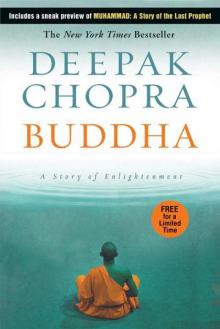 Buddha
Buddha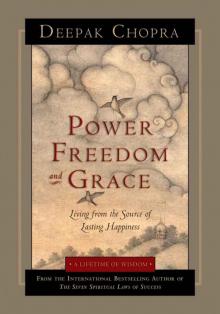 Power, Freedom, and Grace
Power, Freedom, and Grace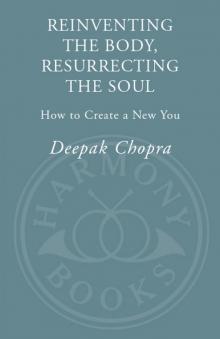 Reinventing the Body, Resurrecting the Soul: How to Create a New You
Reinventing the Body, Resurrecting the Soul: How to Create a New You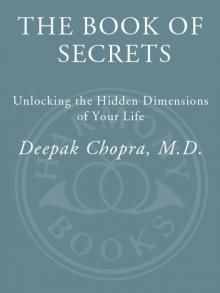 The Book of Secrets: Unlocking the Hidden Dimensions of Your Life
The Book of Secrets: Unlocking the Hidden Dimensions of Your Life Muhammad
Muhammad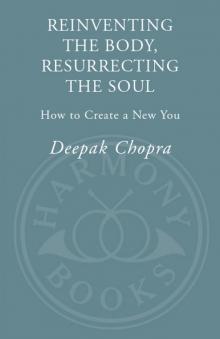 Reinventing the Body, Resurrecting the Soul
Reinventing the Body, Resurrecting the Soul